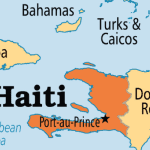Appeal court judges have sharply questioned Donald Trump’s argument that former presidents should be entitled to immunity from criminal prosecution.
In a landmark case, Mr Trump’s lawyers said his time in office protects him from charges connected to his alleged effort to overturn the 2020 election.
But the justice department argued the presidency was not above the law.
Mr Trump, the frontrunner for the Republican presidential nomination, left the Iowa campaign trail to attend.
On Tuesday, his motorcade entered and left the Washington DC courthouse through a rear garage. Mr Trump sat silently with his attorneys during the 75-minute hearing.
Speaking afterwards from the Waldorf-Astoria hotel – which was until recently a Trump hotel – he said his side was “doing very well” in the case and maintained he was facing political persecution from the Biden administration.
The Republican is accused by special counsel Jack Smith of trying to overturn Democratic President Joe Biden’s election victory in 2020.
Mr Trump, 77, says he should not face criminal charges because he was acting as president at the time. He has for years cited presidential immunity while battling civil and criminal cases.
Whichever way the appeals judges rule, the case is widely expected to end up at the US Supreme Court, where conservatives hold a 6-3 majority.
The case could have a profound effect on the future of the American presidency and what is allowable by an individual who holds the office.
It may also delay Mr Trump’s criminal trial for weeks, if not months, during a 2024 political campaign in which the former real estate mogul is a leading contender.
As soon as the case began, the three judges on the US Court of Appeals for the DC Circuit – Karen Henderson, J Michelle Childs and Florence Pan – asked probing questions about the implications of their decision.
Judge Pan, a Biden appointee, sounded particularly sceptical. She asked Mr Trump’s attorney, Dean John Sauer, whether he would contend that a president could sell presidential pardons and state secrets, or order Navy SEALs – the elite US special forces – to assassinate a political rival, without being concerned about criminal prosecution.
Mr Sauer’s argument boiled down to the idea that a president who is not convicted for impeachment by Congress cannot be subject to criminal proceedings. Mr Trump, he noted, was impeached by the House of Representatives, but never convicted by the Senate.
However, James Pearce, the government’s attorney, said such a precedent could easily be short-circuited and undermine Congress and any potential criminal proceedings. All a sitting president would have to do is resign before the legislature is able to begin impeachment proceedings to avoid prosecution, he said.
“What kind of world are we living in if… a president orders his SEAL team to assassinate a political rival and resigns, for example, before an impeachment – not a criminal act,” he said.
Appeal court judges have sharply questioned Donald Trump’s argument that former presidents should be entitled to immunity from criminal prosecution.
In a landmark case, Mr Trump’s lawyers said his time in office protects him from charges connected to his alleged effort to overturn the 2020 election.
But the justice department argued the presidency was not above the law.
Mr Trump, the frontrunner for the Republican presidential nomination, left the Iowa campaign trail to attend.
On Tuesday, his motorcade entered and left the Washington DC courthouse through a rear garage. Mr Trump sat silently with his attorneys during the 75-minute hearing.
Speaking afterwards from the Waldorf-Astoria hotel – which was until recently a Trump hotel – he said his side was “doing very well” in the case and maintained he was facing political persecution from the Biden administration.
The Republican is accused by special counsel Jack Smith of trying to overturn Democratic President Joe Biden’s election victory in 2020.
Mr Trump, 77, says he should not face criminal charges because he was acting as president at the time. He has for years cited presidential immunity while battling civil and criminal cases.
Whichever way the appeals judges rule, the case is widely expected to end up at the US Supreme Court, where conservatives hold a 6-3 majority.
The case could have a profound effect on the future of the American presidency and what is allowable by an individual who holds the office.
It may also delay Mr Trump’s criminal trial for weeks, if not months, during a 2024 political campaign in which the former real estate mogul is a leading contender.
As soon as the case began, the three judges on the US Court of Appeals for the DC Circuit – Karen Henderson, J Michelle Childs and Florence Pan – asked probing questions about the implications of their decision.
Judge Pan, a Biden appointee, sounded particularly sceptical. She asked Mr Trump’s attorney, Dean John Sauer, whether he would contend that a president could sell presidential pardons and state secrets, or order Navy SEALs – the elite US special forces – to assassinate a political rival, without being concerned about criminal prosecution.
Mr Sauer’s argument boiled down to the idea that a president who is not convicted for impeachment by Congress cannot be subject to criminal proceedings. Mr Trump, he noted, was impeached by the House of Representatives, but never convicted by the Senate.
However, James Pearce, the government’s attorney, said such a precedent could easily be short-circuited and undermine Congress and any potential criminal proceedings. All a sitting president would have to do is resign before the legislature is able to begin impeachment proceedings to avoid prosecution, he said.
“What kind of world are we living in if… a president orders his SEAL team to assassinate a political rival and resigns, for example, before an impeachment – not a criminal act,” he said.
Appeal court judges have sharply questioned Donald Trump’s argument that former presidents should be entitled to immunity from criminal prosecution.
In a landmark case, Mr Trump’s lawyers said his time in office protects him from charges connected to his alleged effort to overturn the 2020 election.
But the justice department argued the presidency was not above the law.
Mr Trump, the frontrunner for the Republican presidential nomination, left the Iowa campaign trail to attend.
On Tuesday, his motorcade entered and left the Washington DC courthouse through a rear garage. Mr Trump sat silently with his attorneys during the 75-minute hearing.
Speaking afterwards from the Waldorf-Astoria hotel – which was until recently a Trump hotel – he said his side was “doing very well” in the case and maintained he was facing political persecution from the Biden administration.
The Republican is accused by special counsel Jack Smith of trying to overturn Democratic President Joe Biden’s election victory in 2020.
Mr Trump, 77, says he should not face criminal charges because he was acting as president at the time. He has for years cited presidential immunity while battling civil and criminal cases.
Whichever way the appeals judges rule, the case is widely expected to end up at the US Supreme Court, where conservatives hold a 6-3 majority.
The case could have a profound effect on the future of the American presidency and what is allowable by an individual who holds the office.
It may also delay Mr Trump’s criminal trial for weeks, if not months, during a 2024 political campaign in which the former real estate mogul is a leading contender.
As soon as the case began, the three judges on the US Court of Appeals for the DC Circuit – Karen Henderson, J Michelle Childs and Florence Pan – asked probing questions about the implications of their decision.
Judge Pan, a Biden appointee, sounded particularly sceptical. She asked Mr Trump’s attorney, Dean John Sauer, whether he would contend that a president could sell presidential pardons and state secrets, or order Navy SEALs – the elite US special forces – to assassinate a political rival, without being concerned about criminal prosecution.
Mr Sauer’s argument boiled down to the idea that a president who is not convicted for impeachment by Congress cannot be subject to criminal proceedings. Mr Trump, he noted, was impeached by the House of Representatives, but never convicted by the Senate.
However, James Pearce, the government’s attorney, said such a precedent could easily be short-circuited and undermine Congress and any potential criminal proceedings. All a sitting president would have to do is resign before the legislature is able to begin impeachment proceedings to avoid prosecution, he said.
“What kind of world are we living in if… a president orders his SEAL team to assassinate a political rival and resigns, for example, before an impeachment – not a criminal act,” he said.
Appeal court judges have sharply questioned Donald Trump’s argument that former presidents should be entitled to immunity from criminal prosecution.
In a landmark case, Mr Trump’s lawyers said his time in office protects him from charges connected to his alleged effort to overturn the 2020 election.
But the justice department argued the presidency was not above the law.
Mr Trump, the frontrunner for the Republican presidential nomination, left the Iowa campaign trail to attend.
On Tuesday, his motorcade entered and left the Washington DC courthouse through a rear garage. Mr Trump sat silently with his attorneys during the 75-minute hearing.
Speaking afterwards from the Waldorf-Astoria hotel – which was until recently a Trump hotel – he said his side was “doing very well” in the case and maintained he was facing political persecution from the Biden administration.
The Republican is accused by special counsel Jack Smith of trying to overturn Democratic President Joe Biden’s election victory in 2020.
Mr Trump, 77, says he should not face criminal charges because he was acting as president at the time. He has for years cited presidential immunity while battling civil and criminal cases.
Whichever way the appeals judges rule, the case is widely expected to end up at the US Supreme Court, where conservatives hold a 6-3 majority.
The case could have a profound effect on the future of the American presidency and what is allowable by an individual who holds the office.
It may also delay Mr Trump’s criminal trial for weeks, if not months, during a 2024 political campaign in which the former real estate mogul is a leading contender.
As soon as the case began, the three judges on the US Court of Appeals for the DC Circuit – Karen Henderson, J Michelle Childs and Florence Pan – asked probing questions about the implications of their decision.
Judge Pan, a Biden appointee, sounded particularly sceptical. She asked Mr Trump’s attorney, Dean John Sauer, whether he would contend that a president could sell presidential pardons and state secrets, or order Navy SEALs – the elite US special forces – to assassinate a political rival, without being concerned about criminal prosecution.
Mr Sauer’s argument boiled down to the idea that a president who is not convicted for impeachment by Congress cannot be subject to criminal proceedings. Mr Trump, he noted, was impeached by the House of Representatives, but never convicted by the Senate.
However, James Pearce, the government’s attorney, said such a precedent could easily be short-circuited and undermine Congress and any potential criminal proceedings. All a sitting president would have to do is resign before the legislature is able to begin impeachment proceedings to avoid prosecution, he said.
“What kind of world are we living in if… a president orders his SEAL team to assassinate a political rival and resigns, for example, before an impeachment – not a criminal act,” he said.
Appeal court judges have sharply questioned Donald Trump’s argument that former presidents should be entitled to immunity from criminal prosecution.
In a landmark case, Mr Trump’s lawyers said his time in office protects him from charges connected to his alleged effort to overturn the 2020 election.
But the justice department argued the presidency was not above the law.
Mr Trump, the frontrunner for the Republican presidential nomination, left the Iowa campaign trail to attend.
On Tuesday, his motorcade entered and left the Washington DC courthouse through a rear garage. Mr Trump sat silently with his attorneys during the 75-minute hearing.
Speaking afterwards from the Waldorf-Astoria hotel – which was until recently a Trump hotel – he said his side was “doing very well” in the case and maintained he was facing political persecution from the Biden administration.
The Republican is accused by special counsel Jack Smith of trying to overturn Democratic President Joe Biden’s election victory in 2020.
Mr Trump, 77, says he should not face criminal charges because he was acting as president at the time. He has for years cited presidential immunity while battling civil and criminal cases.
Whichever way the appeals judges rule, the case is widely expected to end up at the US Supreme Court, where conservatives hold a 6-3 majority.
The case could have a profound effect on the future of the American presidency and what is allowable by an individual who holds the office.
It may also delay Mr Trump’s criminal trial for weeks, if not months, during a 2024 political campaign in which the former real estate mogul is a leading contender.
As soon as the case began, the three judges on the US Court of Appeals for the DC Circuit – Karen Henderson, J Michelle Childs and Florence Pan – asked probing questions about the implications of their decision.
Judge Pan, a Biden appointee, sounded particularly sceptical. She asked Mr Trump’s attorney, Dean John Sauer, whether he would contend that a president could sell presidential pardons and state secrets, or order Navy SEALs – the elite US special forces – to assassinate a political rival, without being concerned about criminal prosecution.
Mr Sauer’s argument boiled down to the idea that a president who is not convicted for impeachment by Congress cannot be subject to criminal proceedings. Mr Trump, he noted, was impeached by the House of Representatives, but never convicted by the Senate.
However, James Pearce, the government’s attorney, said such a precedent could easily be short-circuited and undermine Congress and any potential criminal proceedings. All a sitting president would have to do is resign before the legislature is able to begin impeachment proceedings to avoid prosecution, he said.
“What kind of world are we living in if… a president orders his SEAL team to assassinate a political rival and resigns, for example, before an impeachment – not a criminal act,” he said.
Appeal court judges have sharply questioned Donald Trump’s argument that former presidents should be entitled to immunity from criminal prosecution.
In a landmark case, Mr Trump’s lawyers said his time in office protects him from charges connected to his alleged effort to overturn the 2020 election.
But the justice department argued the presidency was not above the law.
Mr Trump, the frontrunner for the Republican presidential nomination, left the Iowa campaign trail to attend.
On Tuesday, his motorcade entered and left the Washington DC courthouse through a rear garage. Mr Trump sat silently with his attorneys during the 75-minute hearing.
Speaking afterwards from the Waldorf-Astoria hotel – which was until recently a Trump hotel – he said his side was “doing very well” in the case and maintained he was facing political persecution from the Biden administration.
The Republican is accused by special counsel Jack Smith of trying to overturn Democratic President Joe Biden’s election victory in 2020.
Mr Trump, 77, says he should not face criminal charges because he was acting as president at the time. He has for years cited presidential immunity while battling civil and criminal cases.
Whichever way the appeals judges rule, the case is widely expected to end up at the US Supreme Court, where conservatives hold a 6-3 majority.
The case could have a profound effect on the future of the American presidency and what is allowable by an individual who holds the office.
It may also delay Mr Trump’s criminal trial for weeks, if not months, during a 2024 political campaign in which the former real estate mogul is a leading contender.
As soon as the case began, the three judges on the US Court of Appeals for the DC Circuit – Karen Henderson, J Michelle Childs and Florence Pan – asked probing questions about the implications of their decision.
Judge Pan, a Biden appointee, sounded particularly sceptical. She asked Mr Trump’s attorney, Dean John Sauer, whether he would contend that a president could sell presidential pardons and state secrets, or order Navy SEALs – the elite US special forces – to assassinate a political rival, without being concerned about criminal prosecution.
Mr Sauer’s argument boiled down to the idea that a president who is not convicted for impeachment by Congress cannot be subject to criminal proceedings. Mr Trump, he noted, was impeached by the House of Representatives, but never convicted by the Senate.
However, James Pearce, the government’s attorney, said such a precedent could easily be short-circuited and undermine Congress and any potential criminal proceedings. All a sitting president would have to do is resign before the legislature is able to begin impeachment proceedings to avoid prosecution, he said.
“What kind of world are we living in if… a president orders his SEAL team to assassinate a political rival and resigns, for example, before an impeachment – not a criminal act,” he said.
Appeal court judges have sharply questioned Donald Trump’s argument that former presidents should be entitled to immunity from criminal prosecution.
In a landmark case, Mr Trump’s lawyers said his time in office protects him from charges connected to his alleged effort to overturn the 2020 election.
But the justice department argued the presidency was not above the law.
Mr Trump, the frontrunner for the Republican presidential nomination, left the Iowa campaign trail to attend.
On Tuesday, his motorcade entered and left the Washington DC courthouse through a rear garage. Mr Trump sat silently with his attorneys during the 75-minute hearing.
Speaking afterwards from the Waldorf-Astoria hotel – which was until recently a Trump hotel – he said his side was “doing very well” in the case and maintained he was facing political persecution from the Biden administration.
The Republican is accused by special counsel Jack Smith of trying to overturn Democratic President Joe Biden’s election victory in 2020.
Mr Trump, 77, says he should not face criminal charges because he was acting as president at the time. He has for years cited presidential immunity while battling civil and criminal cases.
Whichever way the appeals judges rule, the case is widely expected to end up at the US Supreme Court, where conservatives hold a 6-3 majority.
The case could have a profound effect on the future of the American presidency and what is allowable by an individual who holds the office.
It may also delay Mr Trump’s criminal trial for weeks, if not months, during a 2024 political campaign in which the former real estate mogul is a leading contender.
As soon as the case began, the three judges on the US Court of Appeals for the DC Circuit – Karen Henderson, J Michelle Childs and Florence Pan – asked probing questions about the implications of their decision.
Judge Pan, a Biden appointee, sounded particularly sceptical. She asked Mr Trump’s attorney, Dean John Sauer, whether he would contend that a president could sell presidential pardons and state secrets, or order Navy SEALs – the elite US special forces – to assassinate a political rival, without being concerned about criminal prosecution.
Mr Sauer’s argument boiled down to the idea that a president who is not convicted for impeachment by Congress cannot be subject to criminal proceedings. Mr Trump, he noted, was impeached by the House of Representatives, but never convicted by the Senate.
However, James Pearce, the government’s attorney, said such a precedent could easily be short-circuited and undermine Congress and any potential criminal proceedings. All a sitting president would have to do is resign before the legislature is able to begin impeachment proceedings to avoid prosecution, he said.
“What kind of world are we living in if… a president orders his SEAL team to assassinate a political rival and resigns, for example, before an impeachment – not a criminal act,” he said.
Appeal court judges have sharply questioned Donald Trump’s argument that former presidents should be entitled to immunity from criminal prosecution.
In a landmark case, Mr Trump’s lawyers said his time in office protects him from charges connected to his alleged effort to overturn the 2020 election.
But the justice department argued the presidency was not above the law.
Mr Trump, the frontrunner for the Republican presidential nomination, left the Iowa campaign trail to attend.
On Tuesday, his motorcade entered and left the Washington DC courthouse through a rear garage. Mr Trump sat silently with his attorneys during the 75-minute hearing.
Speaking afterwards from the Waldorf-Astoria hotel – which was until recently a Trump hotel – he said his side was “doing very well” in the case and maintained he was facing political persecution from the Biden administration.
The Republican is accused by special counsel Jack Smith of trying to overturn Democratic President Joe Biden’s election victory in 2020.
Mr Trump, 77, says he should not face criminal charges because he was acting as president at the time. He has for years cited presidential immunity while battling civil and criminal cases.
Whichever way the appeals judges rule, the case is widely expected to end up at the US Supreme Court, where conservatives hold a 6-3 majority.
The case could have a profound effect on the future of the American presidency and what is allowable by an individual who holds the office.
It may also delay Mr Trump’s criminal trial for weeks, if not months, during a 2024 political campaign in which the former real estate mogul is a leading contender.
As soon as the case began, the three judges on the US Court of Appeals for the DC Circuit – Karen Henderson, J Michelle Childs and Florence Pan – asked probing questions about the implications of their decision.
Judge Pan, a Biden appointee, sounded particularly sceptical. She asked Mr Trump’s attorney, Dean John Sauer, whether he would contend that a president could sell presidential pardons and state secrets, or order Navy SEALs – the elite US special forces – to assassinate a political rival, without being concerned about criminal prosecution.
Mr Sauer’s argument boiled down to the idea that a president who is not convicted for impeachment by Congress cannot be subject to criminal proceedings. Mr Trump, he noted, was impeached by the House of Representatives, but never convicted by the Senate.
However, James Pearce, the government’s attorney, said such a precedent could easily be short-circuited and undermine Congress and any potential criminal proceedings. All a sitting president would have to do is resign before the legislature is able to begin impeachment proceedings to avoid prosecution, he said.
“What kind of world are we living in if… a president orders his SEAL team to assassinate a political rival and resigns, for example, before an impeachment – not a criminal act,” he said.














